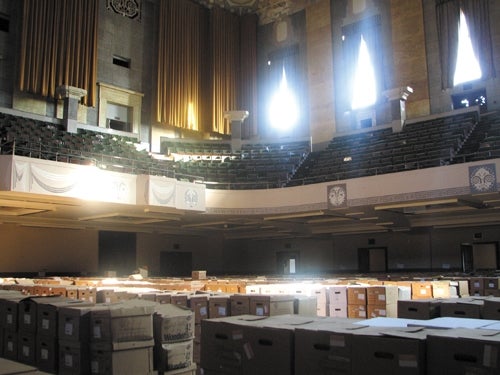Sometime between July and September of 2011, the city of Worcester would like to be executing a deed that takes the grand, 125,000-square-foot Worcester Memorial Auditorium off its hands.
The hall, a massive stone edifice on the corner of Highland and Harvard streets in Worcester’s Lincoln Square, was erected as a monument to those from Worcester who served in World War I.
As a priority parcel in the city’s North Main Street Economic Development Strategy area, the auditorium has been identified as suitable for redevelopment as commercial space or housing. A survey of Worcester residents and businesses also suggested the building could be used for something like the Faneuil Hall Marketplace in Boston.
It’s a long way from any of that now.
Historic Structure
Memorial Auditorium includes two auditoriums, one a small theater-style venue, the other a large, multi-purpose space that hosted basketball games, public gatherings and other events.
But the city hasn’t used it in about 15 years and its main function now is as a temporary repository for state court records, which are neatly stacked in file boxes on the floor of the large auditorium.
The building’s interior is intact but has fallen into disrepair. Plaster walls and ceilings are beginning to crumble, peeling paint is everywhere.
“It’s kind of a shame, when you think about it,” said Heather Gould, a project manager in the city’s economic development office.
Grand civic buildings like Worcester Memorial Auditorium are simply not constructed anymore. And the auditorium is unique. It includes a well-maintained Leon Kroll oil-on-canvas mural depicting Worcester’s wartime history.
The hall was built in the early 1930s, and is a one-of-a-kind mash-up of architectural styles, predominantly Classical Revival and Art Deco.
As venues such as the DCU Center and others were constructed, Memorial Auditorium, which had significant drawbacks as a sports venue and less-than ideal acoustics, became obsolete.
The College of the Holy Cross played basketball at the auditorium before building the Hart Center in 1975. It also hosted Bob Dylan’s Rolling Thunder Review, and served as a shelter after Worcester was hit by a tornado.
In September, the Memorial Auditorium Board of Trustees voted to allow the city to dispose of the property through an RFP process scheduled to begin in January, provided that the mural room and the main lobby facing Lincoln Square is preserved to historical standards.
Spurring Development
The redevelopment of Memorial Auditorium is one piece of an effort to transform that area of the city. In that same neighborhood, the old Worcester County Courthouse is the subject of a Request For Qualifications, and is scheduled to be auctioned in January. Former Worcester Vocational School buildings are being redeveloped as market-rate housing, as well as student housing for Worcester Polytechnic Institute. Meanwhile, the former Crowne Plaza building was purchased earlier this year by the Massachusetts College of Pharmacy and Health Sciences.
The city hopes to choose a developer for Memorial Auditorium in May. But aside from the logistical and historical requirements the project will present, there’s the problem of how to make the property economically feasible.
“The major challenge is to have diverse income sources so you’re not putting all your eggs in the wedding basket, or the concert basket. And it’s vital that you run at an operating profit,” said Bob Kennedy, executive director of Mechanics Hall in Worcester, a similarly historic venue.
And that effort doesn’t stop when the building is refurbished.
Over the last 30 years, Mechanics Hall has put $22 million into capital investments, Kennedy said.
“If you don’t fund your depreciation, you can’t operate for long,” he said.
Other than shoring up the roof, capital improvements have not been done at Memorial Hall. Any buyer/developer would have to evaluate what kind of improvements are necessary to make the building viable.
“Can you build a business plan that can provide the operating income you need year after year?” Kennedy asked. “You can’t rest on your laurels. You can’t let your income slip.” Kennedy said it’s not out of the realm of possibility for Mechanics Hall to make a play for the building, but noted that the Mechanics Hall board doesn’t make strategic decisions quickly.
“I would love to see what would be necessary. I understand it’s not a great basketball arena, and as a concert venue, it left something to be desired, and access is challenging. I can understand why the city would want to get out of that business, but it is a gorgeous building.”

